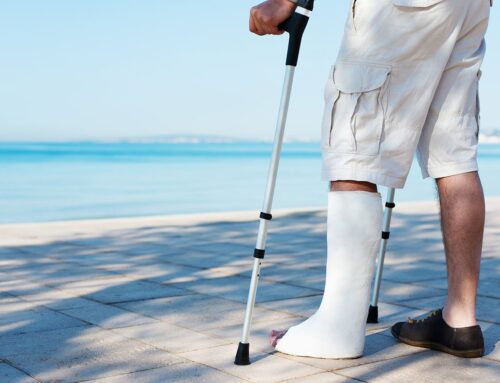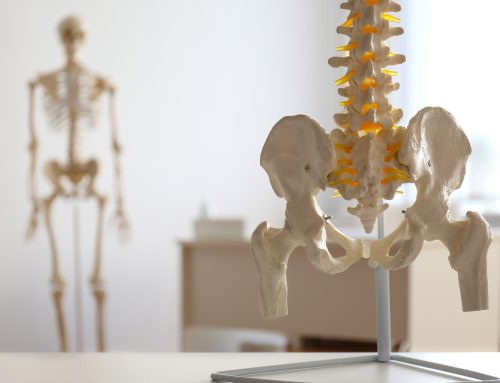Our bone density plays an integral part in our health. If our bones become weak, we’re more prone to fractures, have less energy, and can develop osteopenia and then osteoporosis. Bone density is related to the minerals, particularly calcium, in bone tissue.
While many factors contribute to bone density, including age, sex, and genetics, body weight is also an important consideration. In this article, we’ll explore the relationship between body weight and bone density and discuss how weight management can impact bone health.

The Relationship Between Body Weight and Bone Density
The relationship between body weight and bone density is complex and multifaceted. On the one hand, having a higher body weight can encourage building bone density. This is because the mechanical stress of body weight on bones can stimulate bone growth and increase bone density. By simply walking with excess body weight, you’re activating this process. In fact, studies have shown that people with higher body weight tend to have higher bone density, particularly in weight-bearing bones such as the hips and spine.
However, it's important to note that this relationship is more complex. More weight doesn’t mean better health. Higher body weight can protect bone density, but excessive body weight can also adversely affect bone health. For example, obesity is associated with a higher risk of fractures, particularly in the arms and wrists. This is because excess body weight can put additional stress on bones, leading to an increased risk of fractures. Additionally, obesity can lead to inflammation and hormonal imbalances that can negatively impact bone density.
On the other end of the scale, being underweight can also have negative effects on bone density. When the body doesn't have enough nutrients, including calcium, it will pull these nutrients from bone tissue in order to maintain other bodily functions. This can lead to decreased bone density and an increased risk of fractures.
Improving Bone Density with Weight Management
Maintaining healthy body weight is part of the puzzle for optimal health. So, what can be done to maintain or improve bone density through weight management?
Nutrition
You can exercise 5 days a week, but if you’re only consuming empty carbs and skipping out on calcium-rich foods and drinks, you won’t be doing your body any favours. Adequate intake of calcium, vitamin D, and other nutrients that support bone health is critical for maintaining bone density. In particular, calcium is a key mineral that is needed for strong bones, and it's important to ensure that you're getting enough in your diet.
Good sources of calcium include:
- Dairy products, such as cheese, yogurt, and milk
- Leafy greens, such as broccoli, kale, spinach, cabbage, arugula
- Nuts and seeds
- Fortified foods such as cereal and orange juice.
Exercise
Exercise is another important factor in maintaining bone density. However, some exercises are better for bone density than others. Swimming, for example, doesn’t provide enough weight to be an effective bone-building workout. Weight-bearing exercises, such as running, jumping, and strength training, can help to stimulate bone growth and increase bone density. Aim to engage in weight-bearing and resistance exercises at least three times per week in order to maintain or improve bone density.
This doesn’t mean you have to spend hours at the gym to get results. Weight-bearing and resistance exercises can include, but are not limited to:
- Zumba
- Dancing
- Running
- Tai-chi
Lifestyle
In addition to weight management, nutrition, and exercise, there are other steps you can take to support bone health. If anyone in your family has been prone to fractures or has been diagnosed with osteoporosis, it’s worth being proactive, as genetics can play a part in your bone health. Quitting smoking, reducing alcohol intake, and avoiding falls are all important factors in preventing fractures and maintaining healthy bones.
In summary, body weight can have a significant impact on bone density. While having a higher body weight can protect and build bone density, excessive body weight can have negative effects on bone health. Maintaining healthy body weight, focusing on nutrition, and engaging in weight-bearing and resistance exercises can all help to maintain or improve bone density. If you're concerned about your bone health, talk to your doctor about steps you can take to support healthy bones.
Despite a healthy lifestyle, fractures can still happen. Whether you’ve had an accident on the slopes or are subject to a sports injury, it can be a significant disruption to your daily lifestyle. Your fracture will need to heal properly for you to get back to pre-injury living. With today’s technology, you can take control of the healing process with a low-intensity pulsed ultrasound device that advances the healing of fresh, delayed, and non-union fractures. Contact Fracture Healing to learn more about faster treatment options.
Are you factoring bone density into your lifestyle decisions? What’s your favourite resistance-based exercise? Share your thoughts with our readers in the comments below.





